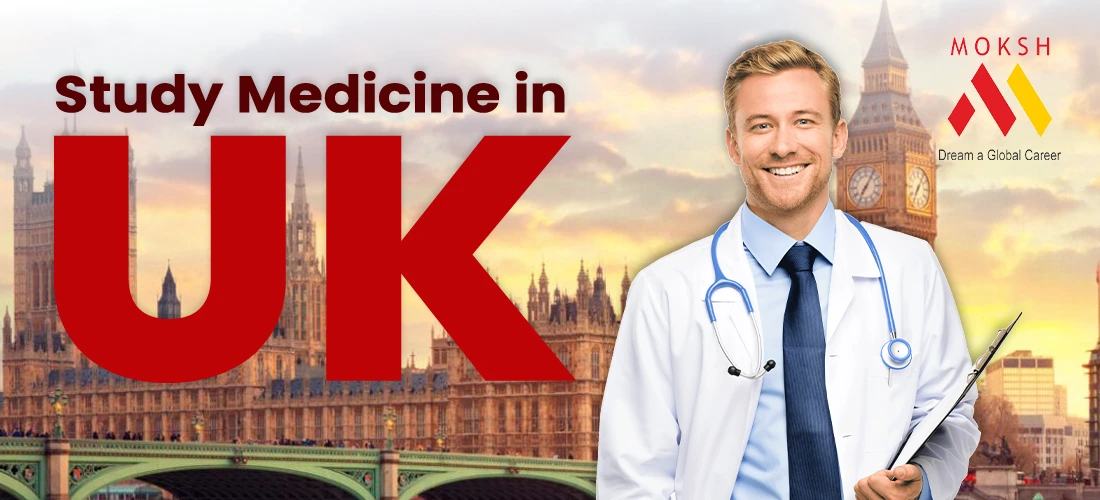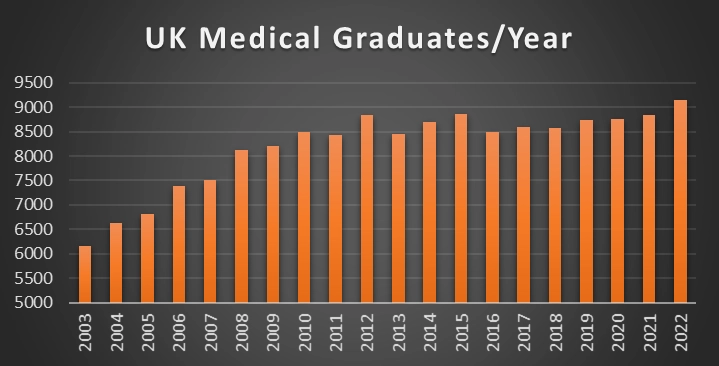
MBBS in the UK for Indian Students
The United Kingdom is renowned for its prestigious Medical schools and world-class healthcare system, making it an attractive destination for international students pursuing a Medical degree in the UK. Medical Universities in the UK give Indian students the chance to be exposed to over 60 specializations. The modular course structures allow students to tailor their learning experience based on their interests and focus.
More than 30,000 Indian doctors are working in UK Healthcare, taking primary education from India, which is approx. 7.2% of UK healthcare and the largest non-British nationality
The UK led Medical education from pioneering the vaccine in 1798 to achieving milestones like the world's first fetal ultrasound and developing the fully articulated prosthetic hand in 2013. The country is committed to making breakthroughs and inspiring future generations.
This commitment is evident in the influx of over 1,000+ students who travel from abroad every year to pursue various Medical courses in the UK, For Indian students, studying Medicine in the UK provides a robust foundation for a successful healthcare career and immerses them in a diverse and multicultural environment.
MBBS in the UK vs MBBS in India
India’s Medical education system is very similar to the UK as India was a British colony & Morden Medical Institutes in India were established by Britishers in 1835 at Kolkata and Madras, their key bases in India. However, there are many differences in catering to their respective countries' healthcare needs. Refer to the table below to understand the key differences between MBBS in India and MBBS in the UK on critical parameters.
| Parameter | India | UK |
|---|---|---|
| Med Schools | 706 | 46 |
| College Type | Pub & Pvt | Pub & Pvt |
| MBBS seats | 1.04 Lacs | 9200 |
| Tuition Fee for Course | Pub 1-3 Lac Pvt 60 Lac-1.5 Cr | 1.8-4 Cr |
| Duration | 4.5 + 1 Yrs | 5 or 6 Yrs |
| Infrastructure | Good to Below Avg | Good to Excellent |
| Degree Awarded | MBBS | MBBS |
| World Rank under 1000 | AIIMS, Delhi | 33 in Top 1000 |
| Teaching Experience | 5-25 Years | 100-500 Years |
| Study Pattern | Pre, Para & Clinical | Pre, Para & Clinical |
| Internship | 1 Year | 1Year |
| Subjects in MBBS | 19 Subjects | 32Subjects |
Duration of Medicine Program in the UK
The duration of MBBS in the UK varies depending on the degree level and the region, including England, Scotland, Wales, and Northern Ireland. Undergraduate courses take 5 to 6 years, postgraduate courses take 2 years, and PhD programs require 4 years. Medical Colleges in England, Northern Ireland and Wales generally offer a 6 year program, while those in Scotland, such as the University of Edinburgh and the University of Glasgow, follow a five year undergraduate program. Opting to study Medicine in England, Scotland, Wales, and Northern Ireland exposes international students to diverse healthcare systems.
Types of Medical Degrees in the UK
As an Indian student aspiring to pursue a career in Medicine in the UK, various Medical degrees are available. The educational journey typically involves completing an undergraduate course, followed by a postgraduate study, and, if aiming for specific roles, a PhD in Medicine.
1. Bachelor of Medicine Degree
Undergraduate Medicine courses cover diverse Medical knowledge and skills, including anatomy, pathology, pharmacology & clinical skills. Admissions to these courses are highly competitive and typically require high grades in science subjects. Duration of the course maybe 4 to 6 Years depending upon direct entry to the Medicine course or entering through the foundation year

2. Postgraduate Medicine Degree
Postgraduate Medicine courses encompass Master of Science (MSc) degrees, postgraduate diplomas, and postgraduate certificates. These programs can be pursued part-time or full-time, covering specialized areas such as Cardiology, Oncology, and neurology. The duration of the PG program is 2 Years.
3. PhD in Medicine Degree
PhD programs in Medicine expect students to conduct detailed research in specific areas of Medicine. These programs typically span three to four years and involve substantial independent study.
Top UK Medical Schools for International Students
Medical Schools in England are known for their excellence and Global ranking among the medical schools worldwide. If you are keen to pursue the best Medicine courses in the UK, You can consider the top 10 ranked Medical Universities in the UK for your education.
| Medical School | Students | QS Rank |
|---|---|---|
| Oxford Medical Sciences Division | 1105 | 2 |
| Cambridge School of Clinical Medicine | 1800 | 5 |
| UCL Medical School | 535 | 6 |
| Imperial College London | 2040 | 8 |
| King's College London | 2080 | 13 |
You can expect exceptional teaching, state-of-the-art research facilities, and diverse clinical experiences in these MBBS Colleges in the UK. The distinguished institutions catering to international students are the University of Oxford, the University of Cambridge, and Imperial College London, which consistently earn top positions in international league tables.
When deciding on a Medical school, it is crucial to consider factors such as location, Tuition fees, living cost, campus amenities, and the availability of scholarships or financial assistance for international students.

Cost of Studying Medicine in UK for International Students
While the UK government imposes caps on annual fees for domestic students, no such restrictions apply to international students. Consequently, tuition fees for international students studying Medicine in the UK can be substantial. The typical MBBS fees in the UK range between £35,000 and £65,000 per academic year. Postgraduate programs generally entail around £39,500 per year.
Below is the Tuition fee for a few of the best Medical Universities in the UK
| University | Degree Name | Fees |
|---|---|---|
| University of Cambridge | Medicine | £63,990 |
| University of Aberdeen | Medicine, MBChB | £50,100 |
| University of Edinburgh | MBChB Medicine | £35,000 |
| Imperial College London | MBBS Medicine | £46,650 |
| University of St Andrews | Medicine BA (Hons) | £35,920 |
To alleviate the financial burden of studying Medicine in the UK, students can explore options such as scholarships, which can contribute to reducing overall costs. The cost of MBBS in the UK for Indian students will range from 30-55 Lacs per academic year.
Scholarships for International Medical Students in the UK
Financial assistance for international Medical students studying in the UK is often limited, as government-funded loans and grants are typically unavailable to international Students.
Moreover, individual universities may extend financial support through scholarships or bursaries, which could be awarded based on academic merit, financial need, or other specified criteria by the respective Medical college in the UK.
Accommodation for International Students in UK
UK universities accommodate international students by providing a range of housing options. These include on-campus residence halls reserved explicitly for international students, off-campus university-managed housing, and private rentals in collaboration with reputable letting agencies.
Many institutions offer dedicated support services, including global student advisors and orientation programs. These services assist with visa-related inquiries, navigating the UK healthcare system, and exploring financial aid opportunities, ensuring that international students integrate smoothly into their new environment while pursuing Medical studies in the UK.
Application deadline for UK Med Schools
The Application deadline for Medical courses in the UK is usually around October 15th of the year before the intended entry, so ensure you prepare your application well.
Entry Requirements for UK Medical Universities
Prospective students applying to a Medical school in the UK typically get three primary course choices:
- Graduate Entry Program
- Standard Medicine Program
- Medicine with a foundation year.
1. Academic Qualification
a). Graduate Entry Medicine (GEM) Program
The graduate-entry Medicine program is designed for undergraduate students in a relevant subject. While many UK Medical universities prefer the previous degree to be health-related, it's not a universal requirement. This program is usually a four-year accelerated degree, though some universities offer a five-year course. The degree conferred upon completion is equivalent to other Medical degrees to become eligible for GMC registration and a license to practice in the UK. Applicants need to meet specific criteria.
Requirements:
- IB Grades: 37 points, including chemistry and another science subject.
- Level: AAA, encompassing chemistry and other sciences like maths, physics, biology, or psychology.
b). Medicine with a Preliminary Year
This program adopts the structure of a 5 year Standard Entry Medicine with an additional year at the beginning, extending it to a six year course. Alternatively, the preliminary year may exist as an independent one year course. It is also called Medicine with a Foundation Year or a similar designation.
Requirements:
- IB Grades: 34 points.
- A-level: AAA.
c). Medicine with a Gateway Year
The Gateway to Medicine is a year-long program designed to assist you in preparing for our five-year Medicine course. Completing a foundation or pre-clinical course is necessary before securing admission to an undergraduate Medicine degree in a UK Medical college.
- IB Grades: 32 points.
- A-level: BBC at A level, with Chemistry included. Additionally, Grade B must be achieved in a science subject.
2. Medical School Personal Statement
Making an impressive personal statement for the application process for those aspiring to Study in UK. Your Personal Statement must include:
- Your aspirations as a future doctor.
- Your dedication to pursuing Medicine and contributing to the UK healthcare system
- Academic achievements that highlight your qualifications.
Moreover, you may be required to furnish references from teachers or professionals who can recommend you for your academic prowess and personal qualities.
3. English Proficiency
Given that English is a primary language of instruction in UK Medical Universities, international students must demonstrate proficiency in the language.
Most universities acknowledge IELTS or TOEFL as proof of English language competency. While the required scores may differ among institutions, Medical schools generally anticipate an overall IELTS score of 7.0 or higher, with no section falling below 6.5 or a TOEFL score of at least 100.
4. UCAT & BMAT Exam
The University Clinical Aptitude Test (UCAT) and the BioMedical Admissions Test (BMAT) are standardized entrance exams mandated by most UK Medical schools. These assessments gauge cognitive abilities, problem-solving skills, and critical thinking relevant to the Medical field. While most Medical schools utilize the UCAT, a select few, including the University of Oxford, University of Cambridge & Imperial College London, necessitate the BMAT exam.
International students must take either the UKCAT or the BMAT, depending on the specific requirements of the Medical schools they are applying to. Both exams are available at UCAT test centres globally, eliminating the need for travel to the UK.
5. Medical Work Experience
Medical school admission boards highly value work experience as it exemplifies the pertinent skills and character strengths required for a career in Medicine. Practical work experience also underscores a student's capacity to work independently or collaboratively, as well as their communication skills, enthusiasm, and sense of responsibility. Networking with professionals, attending conferences, and joining Medical societies can aid students in staying informed about Medical advancements and fostering their careers.

Application Process for UK Medical Schools
The centralized application platform for undergraduate programs in the UK is UCAS. Medical Universities in the UK adhere to a quota system restricting the number of international (outside the EU) students they can admit for Medicine courses each year.
To pursue Medicine in the UK, universities establish their own admission criteria. Prospective students must pass specific Medical entrance exams before gaining acceptance to a UK Medicine course. Completing the UKCAT or the BMAT is mandatory for undergraduate Medical programs.
Interview
Like their domestic counterparts, international students must undergo interviews for admission to Med Schools in the UK. Various schools offer different options, including virtual interviews, on-site interviews in the UK. Before applying, consider your willingness to travel for an interview and explore university websites or contact admissions boards to gather information about the interview process they offer.
Direct Entry toUK Medical Schools
One avenue for applying to Medical Colleges in the UK is through Direct Entry, allowing students to apply directly to specific Medical schools outside the UCAS system, where the choices are typically limited to four.
This option often involves distinct deadlines and requirements compared to the UCAS process. Nonetheless, it is a valuable alternative for international students looking to maximize their chances of securing a seat.
Examples of Medical schools offering Direct Entry for international students include:
- Chester Medical School
- Queen Mary University of London Malta
- Brunel Medical School
- Buckingham Medical School
- UCLAN Medical School
Medical Careers and Salaries in the UK
there are more than 60 super specializations which generally fall into the following categories:
- General Practice
- Anaesthetics
- Surgery
- Medicine
- Radiology
- Pathology
- Psychiatry
The average salary for Medical professionals can vary significantly based on their speciality, experience level, and location. According to data from the National Careers Service and the NHS, the earnings of Medicine practitioners vary according to their specializations.
- Medical Researcher: £25,000 - £60,000 per year
- Physician: £40,000 - £102,500 per year
- General Practitioner (GP): £72,000 - £105,000 per year
- Psychiatrist: £79,860 - £107,668 per year
- Surgeon: £79,860 - £149,400 per year
- Consultant: £82,096 - £110,683 per year
Medical PG Study in the UK for International Students
International students can explore various postgraduate courses in the UK after completing an undergraduate Medical degree (MBBS or MBChB).
However, international Medical graduates must undergo Foundation Training before further training. This two-year program offers a comprehensive introduction to clinical practice in the UK. It is a prerequisite for entering speciality training programs like Core Medical Training (CMT) or Core Surgical Training (CST).
After completing foundation training, international students can explore various postgraduate avenues.
- Master's degrees (MSc, MRes),
- Doctor of Philosophy (PhD) programs,
- Postgraduate diplomas or certificates.
- Notable options include the Diploma in Child Health (DCH) and the Diploma in Obstetrics and Gynaecology (DRCOG).

Work Opportunities and Visa Regulations for International Medical Students in the UK
Students outside the EU must apply for a Tier 4 (General) student visa when pursuing a Medical degree in the UK. This application can be submitted up to three months before the course commences, emphasizing the importance of early action.
International students enrolled in a Medical program in the UK are permitted to work part-time during their studies, up to 20 hours per week during term time, and full-time during holidays, contingent on their visa conditions.
Upon completing their Medical degree, students can apply for either the UK Skilled Worker visa or the Graduate Route visa to practice as a doctor in the UK.
The skilled worker visa facilitates international Medical graduates working within the National Health Service (NHS) or private healthcare settings.
The Graduate Route visa allows international students who have completed a qualifying degree in the UK to stay and work for two years (or three years for doctoral graduates) without requiring a job offer or sponsorship.



